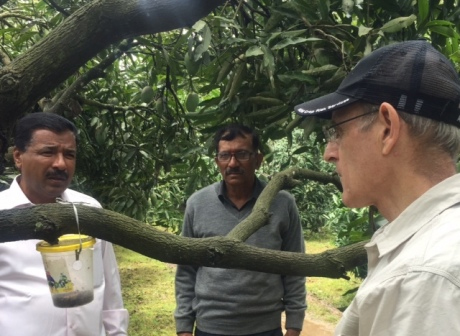Professor John Mumford obituary
In John Mumford’s untimely and unexpected death, we have lost a true friend, colleague, mentor, teacher and pre-eminent authority in Environmental Risk Management. From his career-long base at Imperial College, John’s work and collaborations took him the world over and he was widely considered one of the most effective international advisors on many aspects of environmental management.
John joined Imperial College London as a PhD student in 1975, becoming a lecturer only four years later. Closely tied to Life Sciences, John’s base has mostly been the Centre for Environmental Policy (CEP) where he was critical to its strategic evolution, becoming its director from 2006-2011. Throughout his academic life, John worked at the interdisciplinary interface of applied ecological management and socio-economic management of environmental research and development projects. His abiding interest in entomology and the control of pests in tropical and temperate agricultural settings led to the design of applied environmental management systems that had far-reaching impacts on food provision and perishable trade around the world.
Introduced pests and invasive species cause over $1 trillion in annual damage worldwide, are a significant barrier to trade, and are second only to habitat loss as a cause of global environmental harm. John’s guidance engendered a series of standards, quantitative models and decision procedures that have been adopted by policymakers, regulators and biosecurity risk managers in UN agencies, EU regulatory bodies and national authorities. John produced economic and ecological risk assessment frameworks for quarantine and eradication management protocols and regulations which have been implemented by national government agencies in Australia, New Zealand, the United Kingdom, India, South Africa, Israel, Portugal, Pakistan, Mauritius, Seychelles and St Helena. The research he led on pest risk assessment has informed working groups on which he served in their provision of international guidance and regulations on the use of genetic and radiation-based technologies for pest control for the European Food Safety Authority (EFSA), the World Health Organisation (WHO) and the International Atomic Energy Agency (IAEA).
 John's work is evidenced in the practices of the world's largest and most influential international and regional development organisations (e.g., UN Food and Agriculture Organisation (FAO), the World Trade Organisation (WTO), EU International Plant Protection Convention (IPPC)) and he represented the UK at the International Atomic Energy Agency during 2001 – 2004 and later in 2017 to 2020 as a member of its Standing Advisory Group on Nuclear Applications (2017-2020). His decision tool appraisal systems for pest management have set the standard internationally for more than 40 years. Professor Mumford's quantitative, pathways-based modelling has been used to justify new standards and procedures for biosecurity and has been adopted by implementing agencies (EFSA, UK Defra) and by international standard setting bodies (IPPC, WTO). Professor Mumford provided technical direction to the evaluation of the European Plant Health regime that led to pathway risk analysis being included as a key platform for biosecurity risk management in the EU Plant Health Regulation (2016), implemented in 2019. John led the design for a prototype quantitative pathway analysis tool for pathway risk analysis for the EFSA, which oversees all fresh produce imports into the EU, worth over €20bn in 2019. With support from the Standards and Trade Development Facility of the WTO, Professor Mumford and colleagues developed a pathway-based production chain management system for South-East Asian markets. This management system was adopted by the Philippines, Vietnam, Malaysia and Thailand, and was a critical enabling factor assisting these developing economies to negotiate trade agreements to export food commodities that satisfy international IPPC phytosanitary requirements.
John's work is evidenced in the practices of the world's largest and most influential international and regional development organisations (e.g., UN Food and Agriculture Organisation (FAO), the World Trade Organisation (WTO), EU International Plant Protection Convention (IPPC)) and he represented the UK at the International Atomic Energy Agency during 2001 – 2004 and later in 2017 to 2020 as a member of its Standing Advisory Group on Nuclear Applications (2017-2020). His decision tool appraisal systems for pest management have set the standard internationally for more than 40 years. Professor Mumford's quantitative, pathways-based modelling has been used to justify new standards and procedures for biosecurity and has been adopted by implementing agencies (EFSA, UK Defra) and by international standard setting bodies (IPPC, WTO). Professor Mumford provided technical direction to the evaluation of the European Plant Health regime that led to pathway risk analysis being included as a key platform for biosecurity risk management in the EU Plant Health Regulation (2016), implemented in 2019. John led the design for a prototype quantitative pathway analysis tool for pathway risk analysis for the EFSA, which oversees all fresh produce imports into the EU, worth over €20bn in 2019. With support from the Standards and Trade Development Facility of the WTO, Professor Mumford and colleagues developed a pathway-based production chain management system for South-East Asian markets. This management system was adopted by the Philippines, Vietnam, Malaysia and Thailand, and was a critical enabling factor assisting these developing economies to negotiate trade agreements to export food commodities that satisfy international IPPC phytosanitary requirements.
The improvements in risk management tools and regulatory frameworks John directed have facilitated horticultural trade with substantial economic benefits for producers in the global south. Major programmes include fruit fly management using sterile insects in the Mediterranean basin (EU CLEANFRUIT project). Mumford’s area-wide fruit fly bait and trap approach was deployed to Indian mango fruit fly control, enabling tens of thousands of mango farmers to shift from production of low-price pulp and juice to higher value fresh fruit. The resulting increased farm gate value of $700 million/year "transformed the incomes, and the lives, of many rural families" and the annual value of mango production in India increased in value by US$ 3.5 billion in five years. Similar research commissioned by the UK’s Department for International Development in Pakistan won awards as this technical solution obviates the need for dangerous and environmentally damaging chemical use.
Professor Mumford has been closely involved in the development of UK government biosecurity policy. As Chair of Defra's Non-native Species Risk Analysis Panel, he has advised government on design and implementation of effective biosecurity measures; more widely, the process led by Mumford has strongly influenced the EU's approach, including its risk methodology, when the EU invasive alien species regulation came into force in 2015. John was a member of Defra's Tree Health and Plant Biosecurity Task Force, to advise on how to safeguard the country's trees, woods and forests from invasive pests and diseases. The Taskforce's recommendations were implemented in full and included creation of a new Plant Health Risk Register, a methodological innovation based on Mumford's work which was launched in 2014. This novel approach is an extremely effective policy innovation which allows monthly threat reviews by the Plant Health Risk Group and improves risk messaging to encourage behavioural changes in the horticultural and forestry sectors.
 In 2012, John officially joined the Target Malaria project, funded by the Bill and Melinda Gates Foundation, which he and his wife and collaborator Megan Quinlan had been supporting since its inception. John’s vast expertise in pest management, development projects and risk analysis led to him being present in all facets of the project as it has evolved, ranging from coordination of external risk assessments with CSIRO, to contributing to development of field release plans, to supporting cost benefit analysis, to review of communications materials. John contributed heavily to manuscripts to support this novel methodology, one on systematic identification of plausible pathways to potential harm and one on recommendation for environmental risk assessment for gene drive applications for malaria vector control, these are internationally key resources. As a Principal Investigator for the project, John was also an active member of the senior management committee liaising at the highest levels.
In 2012, John officially joined the Target Malaria project, funded by the Bill and Melinda Gates Foundation, which he and his wife and collaborator Megan Quinlan had been supporting since its inception. John’s vast expertise in pest management, development projects and risk analysis led to him being present in all facets of the project as it has evolved, ranging from coordination of external risk assessments with CSIRO, to contributing to development of field release plans, to supporting cost benefit analysis, to review of communications materials. John contributed heavily to manuscripts to support this novel methodology, one on systematic identification of plausible pathways to potential harm and one on recommendation for environmental risk assessment for gene drive applications for malaria vector control, these are internationally key resources. As a Principal Investigator for the project, John was also an active member of the senior management committee liaising at the highest levels.
At the CEP and elsewhere, John was a passionate and committed teacher and mentor of undergraduate, masters and doctoral students. His supervision of student research guided and inspired many and frequently led to real-world policy implementation. A recent PhD supervision led to the implementation of management plans for data-limited fish stocks, providing advice that had not previously been available for setting EU and UK fisheries quotas. John’s support and mentoring role for students was complemented by his great encouragement of young and developing academic colleagues and co-workers. John has left a legacy of many thousands of past students and colleagues who continue to contribute to science and policy in a wide range of domains.
Through his advice, research and teaching, John’s quietly modest but impactful work leaves a substantial legacy. Through him and the teams he has shaped and led, many natural resources are genuinely better managed. He has been a good friend and advisor to so many, the safest pair of hands that you could ask for and someone who was always open to a good discussion or to simply listen if you needed an ear. He will be sorely missed by all those that had the opportunity and privilege to engage with him throughout the years.
There is an online Book of Remembrance, please add your kind thoughts and memories to this so that John's widow and close colleague, Megan Quinlan and John's family can share in your memories.
Book of remembrance
There is an online Book of Remembrance, please add your kind thoughts and memories to this so that John's widow and close colleague, Megan Quinlan and John's family can share in your memories.
Legacy
There are various tributes and preferred charities in the UK and USA. Please contact Megan Quinlan regarding any of these, m.quinlan@imperial.ac.uk
For any enquiries relating to current research and publications please contact Adrian Leach, a.w.leach@imperial.ac.uk and for academic references Tilly Collins t.collins@imperial.ac.uk will be able to help.